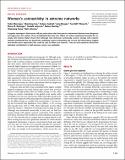Women’s connectivity in extreme networks

View/
Author
Manrique, Pedro
Cao, Zhenfeng
Gabriel, Andrew
Horgan, John
Gill, Paul
Qi, Hong
Restrepo, Elvira M.
Johnson, Daniela
Wuchty, Stefan
Song, Chaoming
Johnson, Neil
Note: Order does not necessarily reflect citation order of authors.
Published Version
https://doi.org/10.1126/sciadv.1501742Metadata
Show full item recordCitation
Manrique, P., Z. Cao, A. Gabriel, J. Horgan, P. Gill, H. Qi, E. M. Restrepo, et al. 2016. “Women’s connectivity in extreme networks.” Science Advances 2 (6): e1501742. doi:10.1126/sciadv.1501742. http://dx.doi.org/10.1126/sciadv.1501742.Abstract
A popular stereotype is that women will play more minor roles than men as environments become more dangerous and aggressive. Our analysis of new longitudinal data sets from offline and online operational networks [for example, ISIS (Islamic State)] shows that although men dominate numerically, women emerge with superior network connectivity that can benefit the underlying system’s robustness and survival. Our observations suggest new female-centric approaches that could be used to affect such networks. They also raise questions about how individual contributions in high-pressure systems are evaluated.Other Sources
http://www.ncbi.nlm.nih.gov/pmc/articles/PMC4928915/pdf/Terms of Use
This article is made available under the terms and conditions applicable to Other Posted Material, as set forth at http://nrs.harvard.edu/urn-3:HUL.InstRepos:dash.current.terms-of-use#LAACitable link to this page
http://nrs.harvard.edu/urn-3:HUL.InstRepos:27822351
Collections
- FAS Scholarly Articles [18292]
Contact administrator regarding this item (to report mistakes or request changes)

